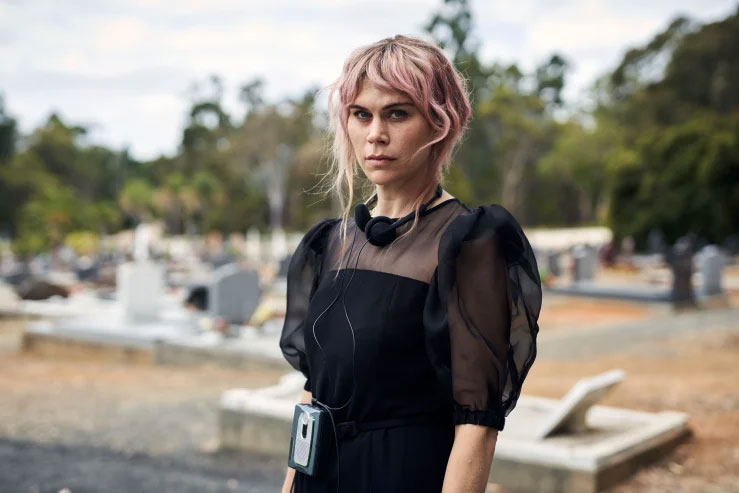Australian Tumbleweeds
Frankly, we give a damn
It’s been good to see people talking about the lack of opportunities for young people on the ABC in the past couple of days, prompted by this article in the Sydney Morning Herald.
“I don’t think the ABC could be accused of not giving younger talent opportunities,” the chair of the ABC board incredulously declared on the broadcaster’s RN Breakfast program on Friday morning, in an interview pegged to Ageism Awareness Day.
With that simple statement Ita Buttrose, the most powerful person in the organisation, revealed how little she understands about the ABC’s current programming slate, its trajectory, its growing disconnect from younger Australians who deserve a national broadcaster that caters to them and, perhaps most importantly, the experiences of its precariously employed younger workers.
The context for Buttrose’s remarks was a softball interview on her own network that referenced a column in this masthead that argued the ABC’s new chat show, Frankly, starring veteran RN broadcaster Fran Kelly, was a missed opportunity to take a risk on fresh talent, something the ABC used to have a reputation for, and to re-engage with younger audiences.
The article goes on to detail the ABC’s recent history of failing to incubate new talent and reach young audiences, something its Chair doesn’t seem to know:
Buttrose went on to say that “a lot of our comedy shows are hosted by wonderfully young people”, but didn’t name a single one. That’s because there aren’t any. There is not a single ABC TV comedy or panel show hosted by anyone under the age of 35.
This blog has long argued that the ABC needs to braver and more persistent when it comes to developing new talent and reaching youth audiences. It’s four years since the ABC’s last series of the pilot scheme Fresh Blood. And five years since the ABC launched Tonightly and John Conway/Aaron Chen Tonight. All three programs showcased a lot of young people; almost none of them have had regular gigs on the ABC since.
We know the ABC has suffered badly from years of Coalition budget cuts. And we know young people don’t consume traditional media, but it seems totally against the supposed purpose of the ABC to barely attempt to cater for them. As for attempting to reach young people where they are – social media, watching streaming services, listening to podcasts – forget it!
Having said that, ageism in broadcasting, particularly when it comes to older women, is as much an issue as youthism, and it’s good to see a woman in her sixties getting her own show. What we shouldn’t see the ABC having to do is pick one under-represented group over another. All groups should get their airtime.
Based on its first episode, Frankly will be a decent chat show. The guests were a well-curated mix of much-loved entertainer (Shaun Micallef), local hero (Dr Richard Harris, who helped rescue the Thai football team stuck in a cave back in 2018) and relatable intellectual (astrophysicist Kirsten Banks). And Kelly, drawing on her years of experience interviewing politicians, went beyond the sort of “tell us about your book/album/Netflix special”-type questions you’d get on a commercial television chat show.
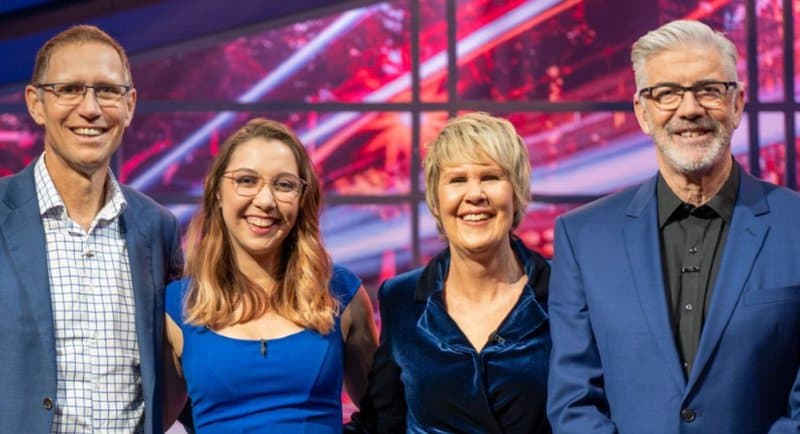
If you’ve been watching Parkinson in Australia on iView, you may spot a few similarities between it and Frankly. Although one of them isn’t the duration. Parkinson in Australia can sometimes feel rather long, with some episodes lasting almost 70 minutes. Frankly, on the other hand, was almost too short at just under 30 minutes.
The interview with third guest, Kirsten Banks, who’d barely had time to give the basics on the fascinating topic of indigenous astronomy, was wound up almost as soon as she’d started, so that Kelly could give her closing remarks. It’s hard to tell why. But it’s hard not to bear in mind the ABC’s age and race biases when considering the fact that it was the young, non-white guest who got the least airtime.
We don’t have a problem with Frankly existing. Chat shows, done well, are a good thing. But we also need investment in genres like comedy and in talent aged under forty. Or else the ABC is dead.
Let’s Put the Future Behind Us
Channel Ten – or Paramount, as their owners like to be called – had their upfronts today, announcing all the big shows we can look forward to in 2023. And the biggest?
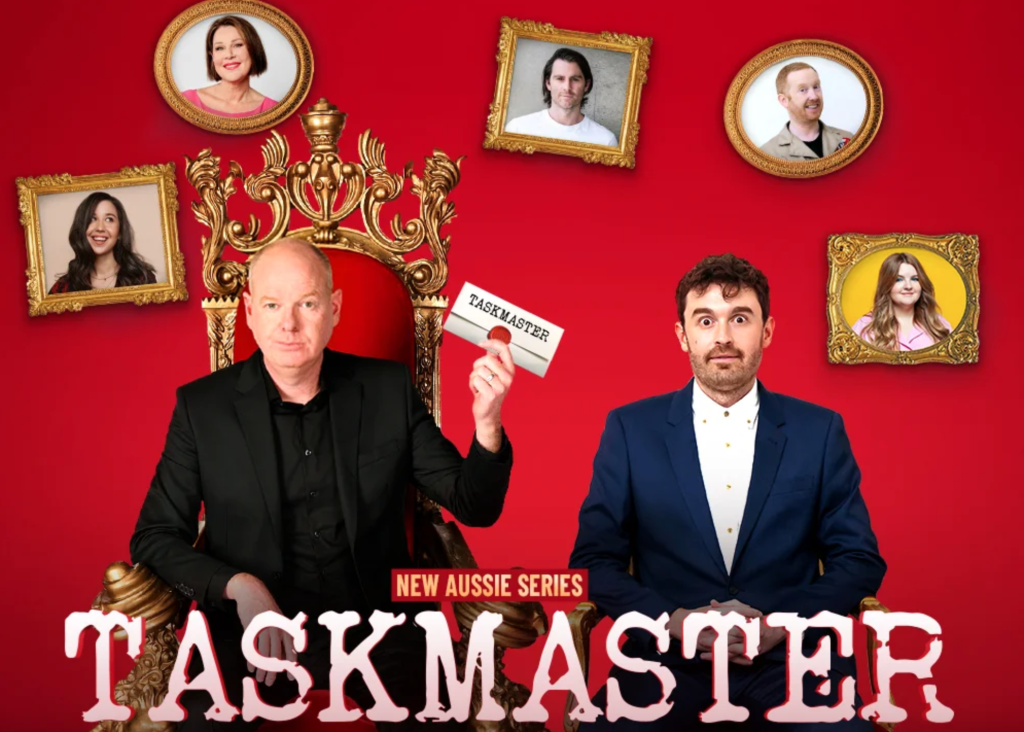
As the press release puts it:
Tom Gleeson Takes Comedians To Task.
BAFTA-winning and International Emmy-nominated comedy powerhouse Taskmaster is set to unleash the LOLs on Australian screens in 2023.
Tom Gleeson stars as the Taskmaster, with Tom Cashman his devoted assistant. Each week the two Toms set five comedians a range of ridiculous tasks designed to bamboozle brains and put funny bones to the test.
Who’ll master the tasks? The cleverest clogs will score the most points from the Taskmaster, while bemusement and bafflement will be rewarded with the fewest points. At series’ end, the comedian with the most points will be crowned Taskmaster champion.
And who exactly are these funny folk, ready to risk their reputations on TV’s most ludicrous, laugh-out-loud comedy show? None other than Julia Morris, Luke McGregor, Jimmy Rees, Nina Oyama and Danielle Walker!
Taskmaster Tom Gleeson said: “Taskmaster is a popular comedy game show from the UK where the host belittles comedians while they carry out tedious tasks.
“People have been asking me to host an Australian version for years. How could I say no? Hosting this show is a bloody match made in heaven!”
Adapted from the hit UK format of the same name, Taskmaster promises to be light on seriousness and heavy on laughs.
“Light on seriousness and heavy on laughs”. Phew, that’s a relief. Also light on originality and fresh faces, but as we’re talking about the network that brought you local versions of Would I Lie to You? (coming back in 2023) and Pointless (never coming back) we can’t really pretend to be surprised there.
In recent years Ten / Paramount has been the only commercial network even slightly interested in local comedy. Nine has a game show hosted by Andy Lee. Seven has whatever Paul Fenech can rustle up for $20. So to have this – and only this – as Ten’s new comedy offering for 2023 is, as is increasingly usual, grim news indeed.
Yes, Have You Been Paying Attention? and The Cheap Seats will be back. Of course they will; unlike pretty much all of Ten’s other recent comedy offerings, they rate well. If there’s any lessons to be learnt from locally created formats being hosted by and featuring new faces, they clearly haven’t yet sunk in after what, a decade now?
We probably shouldn’t complain. Going by the rest of the upfronts, we’re lucky to even get a new comedy show that doesn’t feature badly behaving dogs or some kind of home renovation project. They can’t even tell us if Pilot Week will be back. These days that’s just a collection of reality show formats that nobody but the executives will watch.
The point is, right now Ten is airing two examples of local comedy panel shows that work really well. Deciding the path to success leads directly away from them seems a bit…
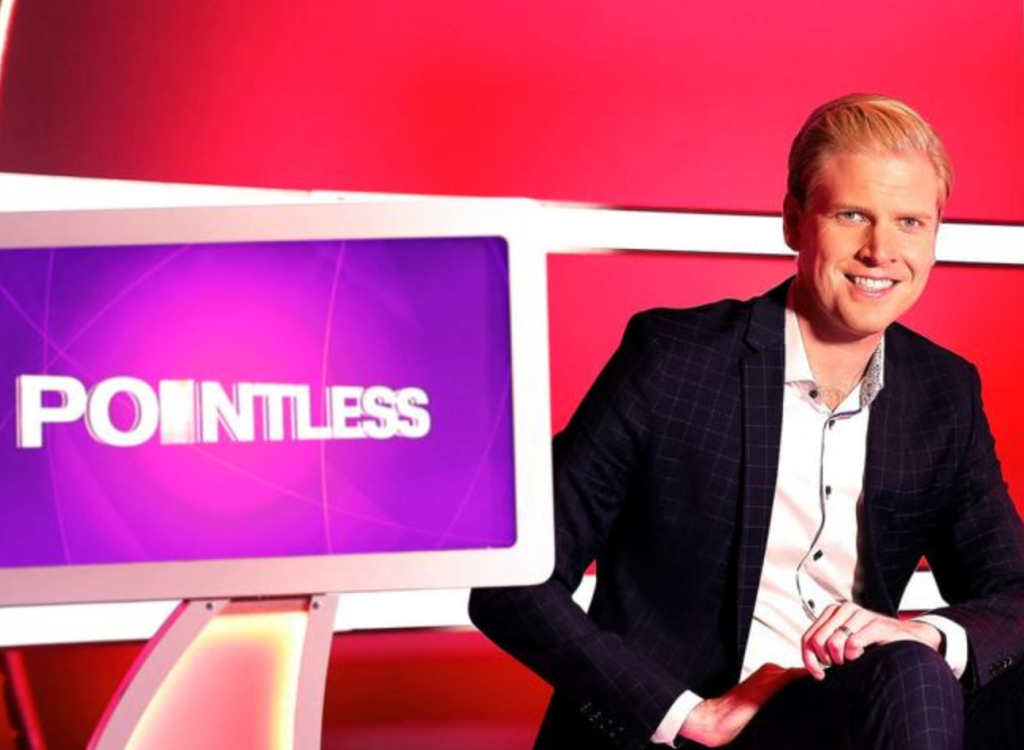
This guy knows what we’re talking about.
Celebrities Answering Questions With Words
It’s been a while since the glory days of SBS comedy, when Pizza was a legitimate cult hit and Swift & Shift Couriers… wasn’t. But they haven’t given up on local comedy entirely – just the scripted stuff – and oh look, it’s a third series of Celebrity Letters and Numbers Australia. We were going to say “a much anticipated third series”, but it’s as big a surprise to us as it is you that it’s back.
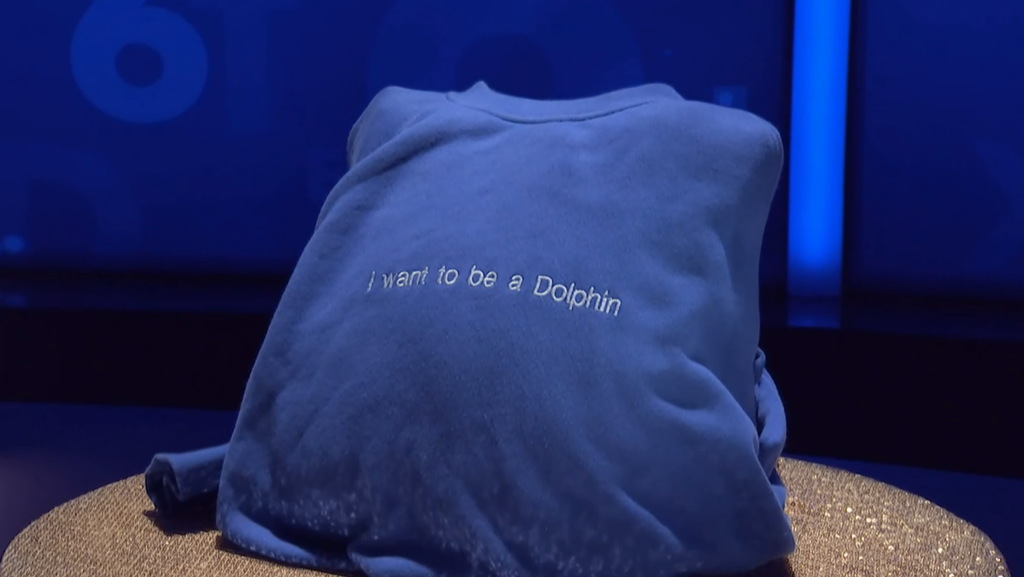
Still, just because it snuck up on us doesn’t mean it’s bad (that’d be Wog Boys Forever, in cinemas this week). Pitched as “the show that’s just like Lego Masters, only without the lucrative merchandising opportunities” by energetic host Michael Hing, and with zero stakes and gag prizes, we are firmly on traditional comedy quiz ground right from the start. Only it’s on SBS! Which means we get fresh faces like… Dave Thornton, Alex Lee, Luke McGregor and Alasdair Tremblay-Birchall. Are we sure this isn’t on the ABC?
It’s always a bit of a worry when a comedy quiz starts out with a lot of banter. Yes, it’s a good way to get in a few laughs that the format otherwise wouldn’t allow, but c’mon. Banter is the lowest form of entertainment; chit-chat is available literally everywhere. If your format requires you to pissfart around for five minutes or so before the show really starts, maybe it’s a bad format?
To be fair, it usually works when it’s 8 Out of 10 Cats Does Countdown, which is a hit in the UK (and SBS has clearly been doing well enough showing the UK version to create a local spin-off). The thing to note here is that the UK has so many of these shows airing so often, they have a decent body of comedians who’re skilled in making these quiz shows work. Which is largely why they… well, work.
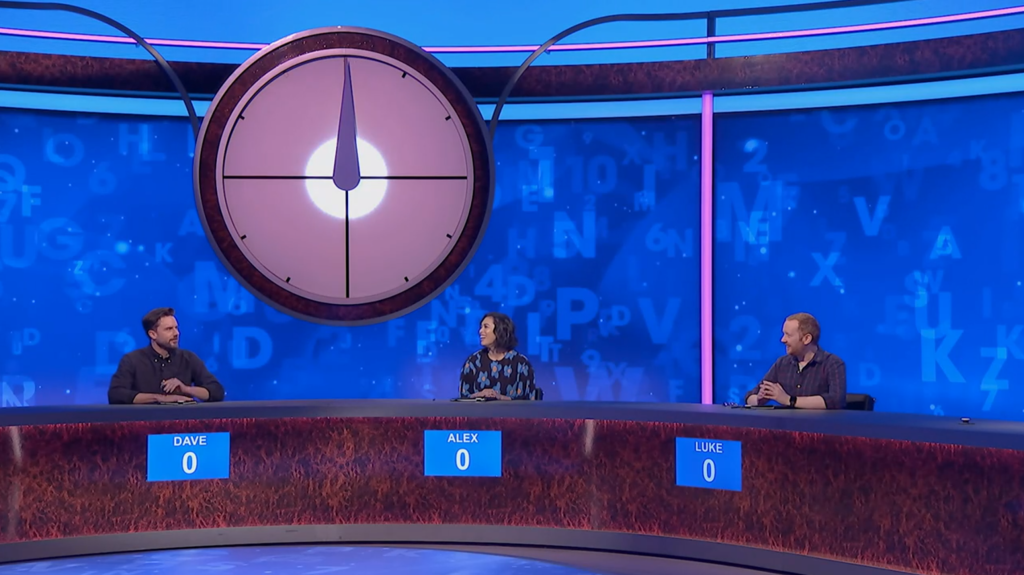
Do you see Sean Lock (RIP) on this panel? Neither do we.
In Australia comedians have to be generalists. We don’t have that many panel shows (and yet somehow it’s still too many) and not all that many comedians either. So we see the same faces again and again behind slightly different desks fumbling their ways through formats that are just different enough that the comedians never seem to get comfortable being involved.
Time to state the obvious: transplanting overseas formats here rarely works. That’s because the overseas formats stumbled across enough local talent with the skills to make them work. The comedians made the format their own, then local producers took that format, gave it to a bunch of people not really suited to it, and expected the magic to happen again.
[narrator voice: it did not]
Celebrity Letters and Numbers Australia is slightly more of an actual quiz than you’d get on the ABC. That makes it slightly better as a show to watch and slightly worse as a show to laugh at.
Generally speaking, Australian comedy quiz shows tend to shy away from requiring the guests to do actual quiz stuff (in case they look like dimwits?). So this has novelty on its side even as the mechanics of the quiz – lots of figuring out word jumbles here – leaves less time for comedy.
Not that this is entirely laugh-free: describing a “Q” as an O with a kickstand added isn’t bad as far as jokes about the structural quality of letters go. But over the hour, the quiz clearly takes priority over the comedy: the dramatic climax is thirty seconds of everyone looking puzzled as they try to unscramble the word “jellyfish”
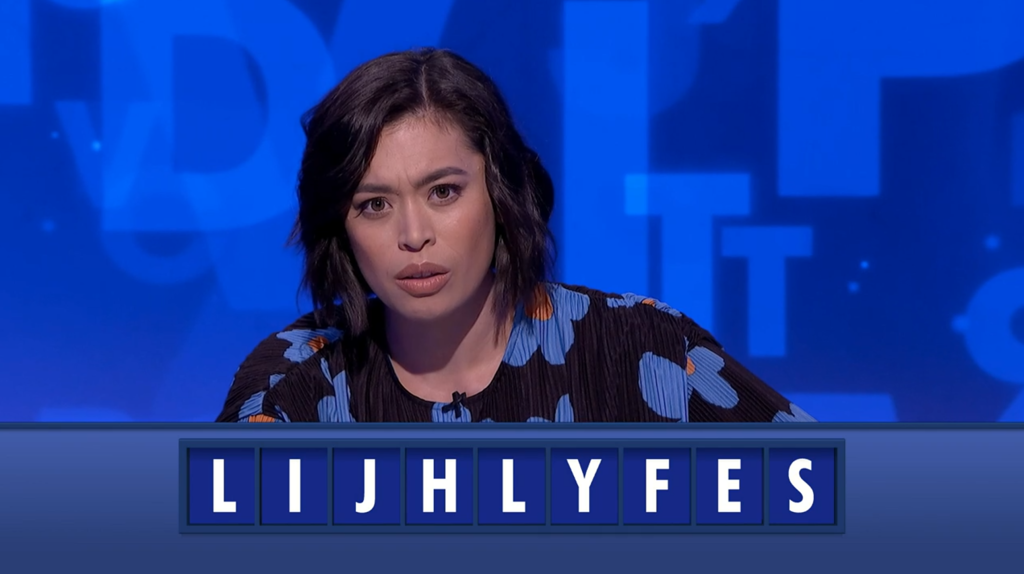
If you want to watch a quiz show that’s an actual quiz only the contestants are halfway decent at banter, then this is the show for you. But then you probably want to watch a quiz show with stakes and tension and actual prizes, none of which this has. It’s a puzzle: maybe we could get a quiz show where Australian television producers try to solve it?
Of course, the team at Working Dog already have, with Have You Been Paying Attention? That works in part because the format is so rigid new guests can just go along for the ride and still do a good job. It helps if they provide their own spin on things, but if they can’t there’s always enough straight news jokes to get them through.
This doesn’t have news jokes. It doesn’t have jokes at all a lot of the time. But it does have a lot of opportunities to try and make words out of random letters. Next week: Mark Humphries!
Questions, Questions
Question Everything is back. For those of you thinking “hang on, a panel show taking a satirical look at the week in news? Didn’t Win the Week just finish up?” let us reassure you that yes, they are the same show.
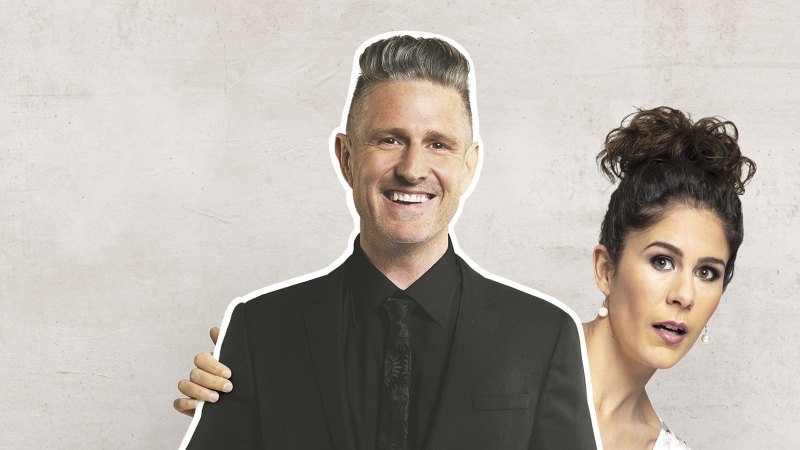
In much the same way that The Weekly and Mad as Hell (RIP) covered roughly the same territory but only one of them was good at it, Question Everything covers the same ground as Win the Week, only the good version is Have You Been Paying Attention?, closely followed by The Cheap Seats.
They’re even covering the same news stories (again). Yes, the “how much would you pay for a hug” report gets its second comedy beat-down of the week. News flash: The Cheap Seats did it better.
So this is the third best news comedy show on this week: does that mean it’s complete shit? Well… not exactly.
The first series stumbled around trying to have a “premise” and a “reason to exist”. This year they’ve thrown all of that out the window – despite claiming they’d be revealing the facts behind the fake news in their promos – and just gone with “here’s a news story, lets make jokes about it”.
Host Wil Anderson brings up the basics of a news story, then asks each member of the three person panel for their jokey take on it. Pre-scripted hilarity ensues, though being pre-scripted does means the jokes are usually halfway decent. Unless they’re coming up with wacky captions for a photo of Ben Affleck, which is the kind of thing that used to take up a third of Hey Hey It’s Saturday.
It’s important to note that there’s no insight provided into the actual news aspects of the story. This is just yet more news jokes based entirely on whatever humourous angle is most obvious. Maybe they should do a segment on how their own promos turned out to be fake news?
Fortunately, based on the first episode at least, they have found some decent panelists. That’s 80% of the battle with these shows. If you don’t get a smile from Matt Parkinson revealing that the solution to dog shit (and every other world problem) is “leave it to the ants”, fair enough; it’s still a step up from whatever they were blathering on about between questions on Win the Week.
This shift in focus does however have one drawback, in the form of co-host Jan Fran. She now has nothing whatsoever to contribute beyond a few show-stopping (and not in a good way) “fact checks” where she reveals the boring truth behind whatever it is the panel have been yukking it up about. You’d assume she’d be quietly phased out if she wasn’t all over the promos.
The result is not quite Gruen News, but only because they’ve gone with halfway decent comedians rather than news experts. It’s pretty much the same structure – there’s even a “come up with your own wacky news headline”* segment – with the same host doing his same shtick. Wil Anderson smokes dope: who knew?
This is basically a superfluous lump of more of the same packed into an already crowded market. It’s also an improvement on the previous series. It’s not a show anyone wants or needs, but if the ABC is determined to have a schedule consisting entirely of panel shows where comedians make jokes about “the news” – meaning wacky minor stories from breakfast TV rather than the actual serious events that affect our lives – they could (and have, and will) do worse.
Whether they should try to do better is another question entirely.
.
*Mad as Hell used to mock shitty tabloid headlines, now its replacement has comedians making up their own versions. There’s a moral there somewhere
Vale sketch comedy?
The end of Mad As Hell begs the question: is this the last we’ll see of sketch comedy on Australian television?
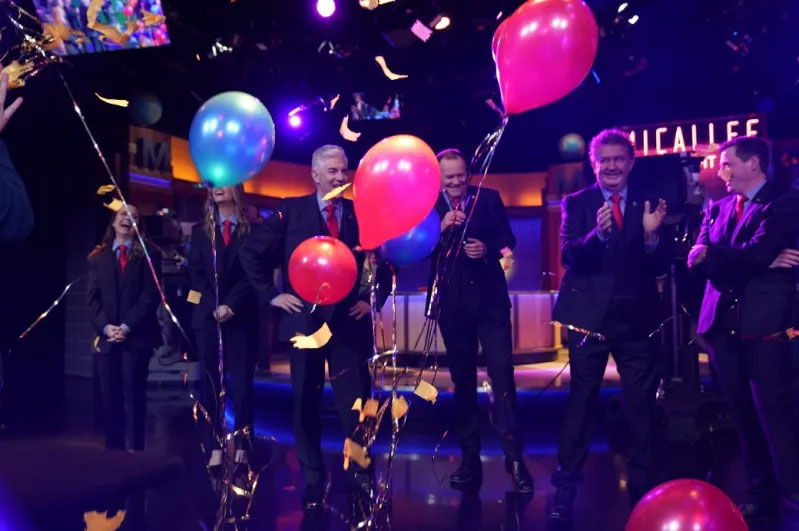
OK, it probably won’t be. There’s occasionally some sort of sketch show in the various new talent showcases and pilot weeks that periodically appear in the schedules. Except, they’re usually terrible and the pilot episode is all we ever see of them.
There have also been rumours of a new sketch show for Seven in 2023, but is that likely to last? Seven’s sketch show heyday was in the early 1990s when there was no internet, streaming or even Foxtel to provide alternatives to the five free-to-air channels. Consequently, audiences were more tolerant if a sketch show included a few dud sketches. These days? They’d have switched over to Netflix the second they stopped laughing. Assuming they’d switched over from Netflix in the first place…
And this is a pity, as it is sketch shows that have historically been a way into television for young comedians. Sketch shows are a place to try out ideas, develop characters and get the experience of making TV comedy that you need to get your own show. The creators of Have You Been Paying Attention?, Fisk and many more great shows all started out in sketch.
Shaun Micallef’s own career benefited from his time on Full Frontal in the early 90s. Until he joined the cast, Full Frontal was a lacklustre ensemble sketch show, trying to crawl out from the shadow of its popular and much-loved predecessor, Fast Forward. But when Micallef hit the screen in 1994, suddenly Full Frontal was worth watching.
The Australian National Nightly Network News sketches, featuring Micallef as former boxer Milo Kerrigan, Francis Greenslade as weatherman Phil Toinby, and another up-and-comer, Kitty Flanagan, as newsreader Narelle Parkinson, were a fan favourite. Viewed almost 30 years on, they seem like a pilot for Mad As Hell, with their surreal dialogue, oddball characters and digs at TV news presentation.
David McGann, another character featuring Micallef parodying TV presenters, also had his debut on Full Frontal.
McGann later appeared in The Micallef P(r)ogram(me).
There is no question the decades of experience Micallef, Francis Greenslade and writer Gary McCaffrie (another Full Frontal alumnus) brought to Mad As Hell were key to its decade-long run. Which is why we worry about the future of TV sketch comedy. Where, exactly, are tomorrow’s comedy teams supposed to get experience?
There are few opportunities to write and perform sketch on TV in 2022. Sammy J and Mark Humphries are basically solo acts, The Feed’s Jenna Owen and Vic Zerbst write and perform their own material, and The Weekly with Charlie Pickering focuses on comedy reportage rather than sketches.
YouTube and podcasting can occasionally propel people to fame and a decent income (Superwog, Aunty Donna) but it’s often a hard slog. Aunty Donna, who’ve been popular on YouTube for more than a decade, will finally get a series on ABC television next year. And the excellent podcast Newsfighters (which technically isn’t a sketch show but if turned into a TV show could easily fill the gap in the Wednesday night topical comedy slot) might not survive unless it can get enough Patreons and sponsors.
If TV sketch comedy is to survive, and we hope it will, broadcasters need to commit to and invest in it. And in the current environment, that takes guts. The last real attempt at this was Tonightly, a topical sketch show made by up-and-coming comedians, which, had it survived, would have been ideal to take over the Mad As Hell slot.
Unfortunately, it was axed. And even worse, it wasn’t replaced with anything. This means that it’s possible that the closest we’ll get to sketch comedy in 2023 is The Weekly with Charlie Pickering. No wonder #SadAsHell was trending.
P.S. We know that Micallef intends to bring back Mad As Hell, or a spin-off, or a 2.0 version, perhaps acting as a script editor or mentor. But it’s far from certain that this will happen, let alone work.
It’s hard to imagine the audience immediately accepting Mad As Hell without Shaun Micallef, for example. Or to imagine the ABC commissioning a new comedy show which isn’t fronted by an established star. So, unless it’s Wil Anderson’s Mad As Hell, or a sitcom featuring Donald McEngadine, we may have to accept that this is really all over.
Vale Mad as Hell 2022
Well, we knew it had to end sometime.
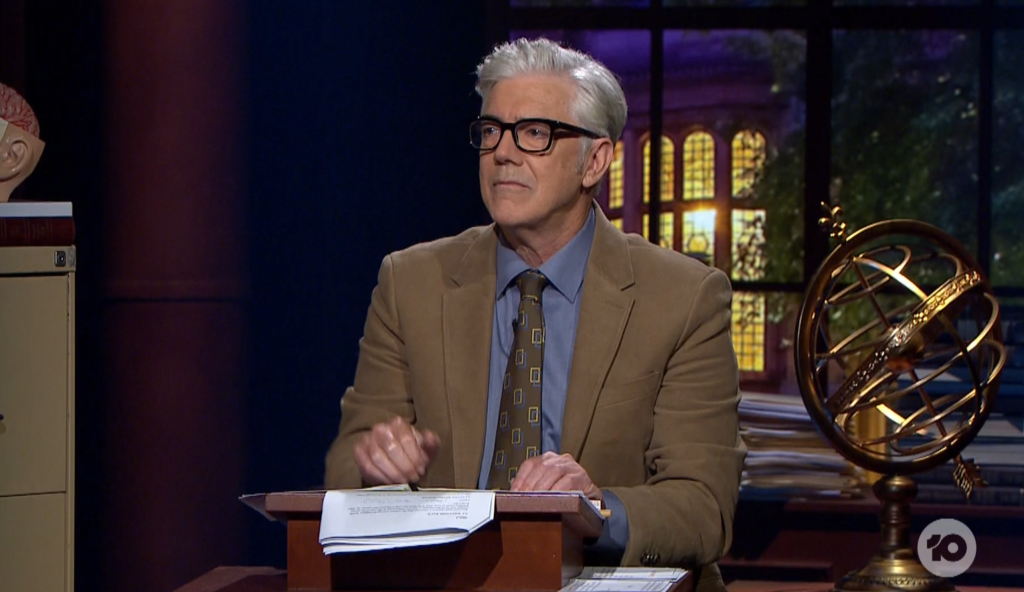
For a bunch of years and slightly more seasons, Mad as Hell has been an island of quality in a sea of mediocrity, the rare Australian comedy that was both Australian and a comedy. Times changed; it changed with it, going from a thinly veiled Newstopia rip-off to that show that was on when The Weekly wasn’t. We’re going to miss it, especially early next year when it’s not back and the ABC is showing some quasi game-show where smug comedians make up rumors designed to discredit government policies because they might possibly benefit the poor. Fun times ahead for sure.
Looking back over the final season of Mad as Hell, the change in government sharpened a lot of the comedy, while (presumably) the ever-shrinking budgets meant the pre-recorded sketches became special treats rather than a regular part of the diet. Mad as Hell was never a show to throw away a decent running joke before its time, but this season most of the classic characters were quietly put away well before the finale. We never got to say goodbye to Lois Price; a nation weeps.
The ratings were up slightly on last season, which is bad news for those commentators who said ABC audiences wouldn’t want to see their new leftie government being mocked. Possibly the news that this would be the final season kept viewers on board; whatever the excuse, they got to see Mad as Hell go out on a high.
The political sketches had bite; the show as a whole seemed more focused than in previous years. The audience knew their place, and Micallef played to them without drawing things out. Any long running show is going to orbit around a sweet spot rather than hit it week after week, but this final season of Mad as Hell got things right pretty much every episode.
The cast were great, but you could say that (and we usually did) about every season. It’d be unfair to single anyone out, especially as there was no Scott Morrison bobblehead or Malcolm Turnbull portrait around to force everyone else to lift their game. At least now Stephen Hall is finally “that guy from Mad as Hell” not “that guy from Romper Stomper“.
It’s unlikely we’ve seen the last of Micallef – he’ll be promoting his latest book for a while yet, and there’s already talk of working on more dramatic projects – but you never know. By the early 00s he seemed like a rock solid fixture in the Australian comedy firmament; a few years later he was doing breakfast radio in Melbourne. Nobody wants to see that again.
Unlike Mad as Hell, which was taken from us too soon. At least the ABC has been nurturing a new generation of comedy talent, as shown in the final ever scene where Micallef was finally unmasked as simultaneously being both Mark Humphries and Sammy J.
So yeah, we’re completely fucked.
Ending the Year on a High Note
Press release time!
Award winning comedy series Fisk returns to the ABC in October
The ABC is thrilled to announce the highly anticipated second season of Fisk will air next month. The multi award-winning six-part comedy series premieres on Wednesday 26 October at 9pm on ABC TV and ABC iview.
In 2021, Fisk was Australia’s number one locally scripted show across all free-to-air* networks – created, written and directed by – and starring – one of Australia’s favourite comedians, Kitty Flanagan as Helen Tudor-Fisk.
The entire key cast reprise their roles including Flanagan, Julia Zemiro, Marty Sheargold, Aaron Chen, John Gaden and Glenn Butcher. They are joined this season by a galaxy of comedic stars including; Marg Downey, Denise Scott, Harley Breen, Stephen Curry, Geraldine Hickey, Zindzi Okenyo, Urvi Majumdar, Stephen Gates (Tripod), Anthony Sharpe, Shane Bourne, Glenn Robbins, Bessie Holland, Rob Sitch, Deborah Kennedy, Matt Okine, Alex Papps, Broden Kelly (Aunty Donna), Colin Lane, Anne Edmonds and Tanika Anderson.
Season two finds it’s business as usual at the Gruber & Associates office. Helen’s (Flanagan) social skills haven’t improved but at least she’s nailing it as a suburban wills and estates lawyer. So much so that Roz (Julia Zemiro) and Ray (Marty Sheargold) mistakenly entrust her with the presentation of their regular Q&A probate information night at the local library.
Meanwhile, Ray is shredding for a school reunion and George (Aaron Chen) finds himself overworked when Roz embarks on a new business venture. On the client front Helen will take on a clown theatre company, a May/December couple with a new baby and a mother who sends her two squabbling sons a message from the grave. But the probate stakes are really raised when a formidable woman comes forward to claim a vaguely worded $10 million bequest from the local crazy cat lady.
…
*OzTAM metro panel, CY 2021, Channel 9/9/10/ABC TV, Comedy/Documentary/Drama programs
Finally some good news out of the ABC! That’s a very impressive line-up of guest stars too – presumably when you’re making a series that requires a steady stream of wacky clients you have to cast the net pretty wide. Alex Papps! We haven’t heard that name since the last series of Fisk.
We’re so happy about this we’re even going to let slide the claim that “In 2021, Fisk was Australia’s number one locally scripted show across all free-to-air* networks” – what does “number one” even mean in this context? Number one half-hour locally scripted comedy airing on Wednesday nights? Fisk is number one in our hearts and that’s what counts.
Unless the new series totally stuffs it up, of course.
And Now, the End is Near
Every day is a day closer to the last day when we have a new episode of Shaun Micallef’s Mad as Hell to look forward to. Sure, we could rejoice in the knowledge that at least we had our time together and that nothing in this world lasts forever. Counterpoint: The Weekly with Charlie Pickering is coming back in 2023 and this world is fucking bullshit*.
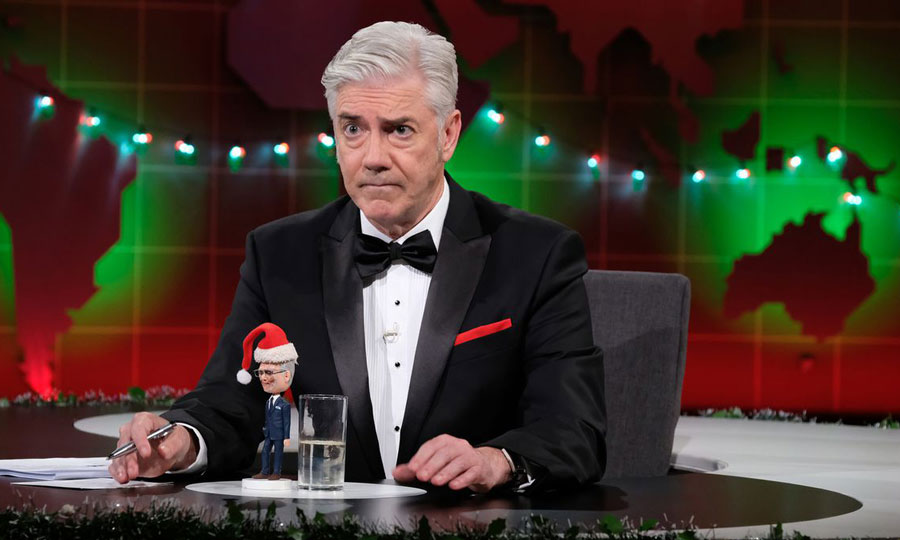
The second last episode of Mad as Hell made a running joke out of the final appearances of a few long running characters. No Kraken for the final ever episode? They must have something really special lined up for that one**.
It seems a touch unlikely that the final episode will be nothing more than a half hour “In Memorandum” crawl… but what if it was? We’re all going to miss junior sub-editor of the Daily Telegraph Chris Lorax, alongside Casper Jonquil, Tosh Greenslade in a wig and glasses, and that policeman riding his bike into a tree. But what about the forgotten heroes?
Will we see Maggie Bathysphere and the panel of ABC sports commentators back one last time? What about Mad as Hell‘s largely and possibly wisely forgotten Financy Boy? Will William Duthie – Elder with Wisdom gift us with one final insight? What about Edith Swink’s daughter? Tony Martin’s John Howard impression? Shaun’s beard?
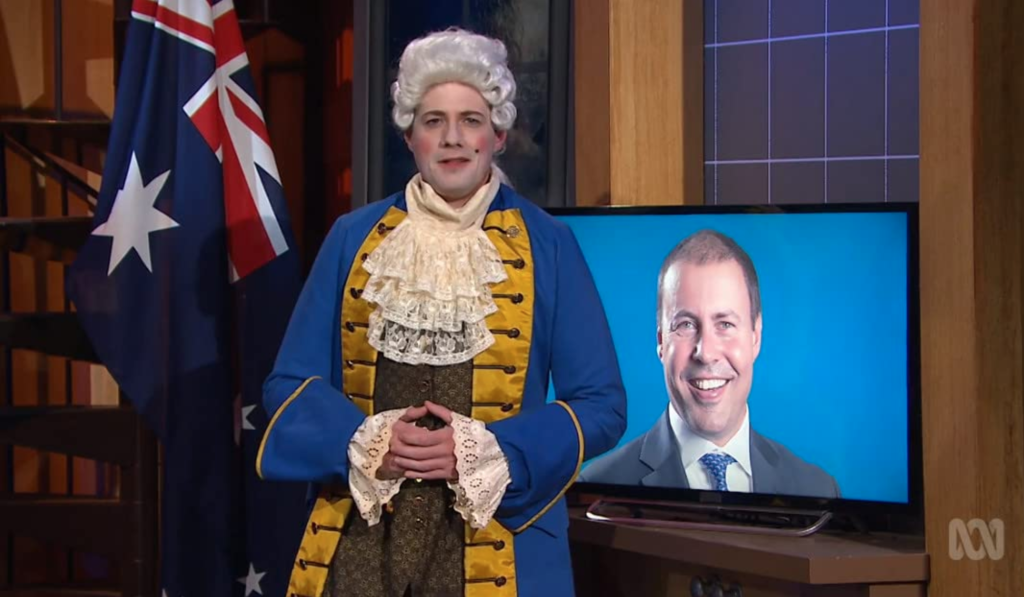
Sure, we’ll probably be able to go on without these characters in our lives; Newstopia‘s Inspektor Herring is now but a distant memory, and he got his own half hour special. And really, it wasn’t so much the individual characters that made Mad as Hell what it was so much as it was the constant ongoing parade of them.
Yes, there were plenty of thinly disguised political parodies, and a bunch of solid comedy cliches who were always useful when it came time to comment on the standard issues of the day. But there were also a lot of uniquely strange characters that popped up – sometimes just the once – that helped make Mad as Hell a show that went well beyond just commenting on the headlines.
It’s easy to come up with a funny name and slap a wig on. Being funny beyond that takes a skill that, going by what we’ve seen lately, is increasingly rare. Forget the “sparkling line-up of characters” that we’re expected to believe have somehow become our family; it’s the animating intelligence behind the show – the combination of writers and performers – that we’re going to miss.
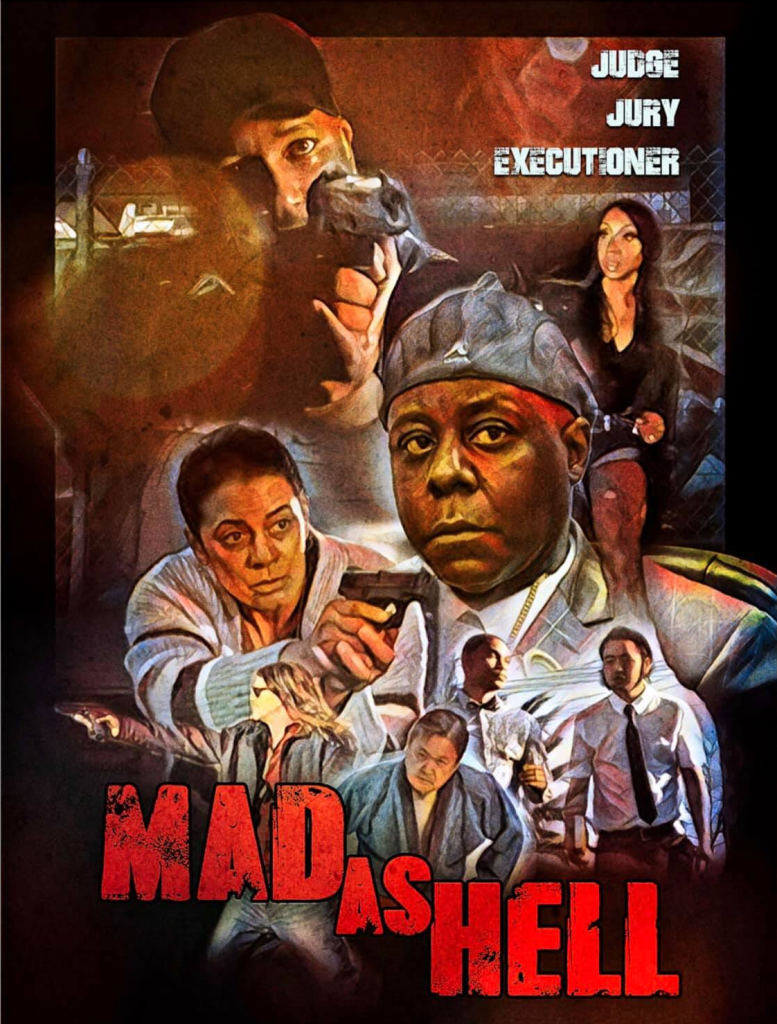
Though yeah, guess we missed the episode with these guys.
.
*Don’t even get us started on the low-key yet strangely persistent rumors that ABC management may have not exactly been a passive player when it came to bringing Mad as Hell to a conclusion
**In shock news, it seems there’ll be a silly final song, which has been a highlight of the conclusion to just about other Micallef project to date
Lost in Limbo
Press release time!
Cameras roll in Queensland on new ABC comedy series Limbo.

The ABC is delighted to announce celebrated Australian actors Ryan Corr and Bob Morley will star in the bold new six-part comedy series Limbo, which has commenced filming in Queensland.
Ryan Corr (Holding The Man, Wakefield, High Ground) returns to Australia after his role as Ser Harwin ‘Breakbones’ Strong in Game of Thrones: House of the Dragon, and Bob Morley (Love Me, Blinder, Neighbours) returns from LA, where he appeared in seven seasons of the sci-fi hit The 100.
Produced by Bunya Productions (Mystery Road, Sweet Country) and Heiress Films (Man Up, Making Couples Happy), Limbo is created by Lucas Taylor (Harrow, Vikings: Athelstan’s Journal), written by Lucas Taylor and Tamara Asmar (On The Ropes, Love Child) and directed by the acclaimed Trent O’Donnell (No Activity, Hacks, Brooklyn Nine-Nine) and David Stubbs (Daffodils, Black Hands).
Also starring is an impressive ensemble cast headed by Emma Harvie (Frayed, The Letdown) and including Shabana Azeez (Metro Sexual S2, The Hunting), Russell Dykstra (Irreverent, Fires, Rake), Lena Cruz (Here Out West, The Unusual Suspects, Dirt Game), Aaron Fa’aoso (Black Comedy, East West 101), Jane Harber (Offspring, The Moodys), Philippa Northeast (Standing Up for Sunny, The Newsreader S2), Josh McConville (Elvis, Fantasy Island), Kamillia Rihani (The Twelve), Georgina Naidu (Seachange, Rosehaven).
Loss and laughs collide in Limbo, which explores the compelling and charmingly funny story of best friends Charlie (Ryan Corr) and Nate (Bob Morley) as they’re faced with how hard it is to let go of those we love – especially when they’re taken too soon. And when they come back to haunt you. Literally.
Todd Abbott, Head of Comedy for the ABC, said, “The fact that so many of this brilliant cast, who are kicking goals internationally, are coming home to make this series speaks volumes about what a special show it is going to be. It’ll warm your heart, break your heart, thump you in the guts and, most importantly, make you laugh the way only a ghost buddy comedy set in Brisbane can.”
Limbo will air on ABC TV and ABC iview in 2023.
For those keeping track of the way “comedy” now means “pretty much everything that isn’t a murder mystery” on your ABC, what starts out as a “bold new six-part comedy series” in paragraph one becomes a series where “loss and laughs collide” by paragraph five.
We were pleasantly surprised by the recent A Beginners Guide to Grief, which tackled the same intersection of loss and comedy with a rarely-seen focus on making the comedy side of things funny. Being around an hour all up didn’t hurt either: losing someone sucks, people act weird in times of loss, organising a funeral can take some funny turns… yeah, think we’ve covered pretty much everything.
Because let’s be honest: if you want to make a comedy, there are a shitload of things funnier than sitting around grieving over a recent death. If you’re making a series about grief, 99% of the time it’s because you want to make a series about grief and the comedy is just there to try and keep everyone else watching.
That said, there’s a long and proud tradition of wacky ghost sitcoms (including that Ghosts show currently on Ten that we’ve never watched). And it’s not like local talent has ever been afraid of hanging around the graveyard to try and juice up a limp comedy premise.
Will the producers start name-dropping classic Aussie dramedy Spirited in interviews? Or is this closer to Josh Thomas’ recent pointless stinker Everything’s Gonna Be Okay (which also started with a surprise death)? Finally, a reason to stay alive until 2023.
Grief does funny things to people
By pure coincidence, SBS’s new dramedy A Beginner’s Guide to Grief dropped just days before many parts of the world found themselves plunged into periods of mourning. So, is this bereavement-themed comedy a good distraction from the endless royal death content which is now dominating the broadcast media? Well, it’s funnier and way less boring than Summer Love, that’s for sure.
A Beginner’s Guide to Grief follows Harriet (Anna Lindner) as she tries to cope with the deaths of her parents, Reggie (Glynn Nicholas) and Diane (Caitlin McDougall). Helpfully, or perhaps not, Diane has left Harriet a self-help guide on cassette (voiced by Ted Lasso’s Brett Goldstein) which offers off-beat advice for the bereaved.
Of less help are the residents of Harriet’s hometown, Schutzenfuchs, a fictional village inspired by German-settled parts of South Australia such as Hahndorf and the Barossa Valley. The townsfolk include Harriet’s Uncle Trevor, a Lutheran Revivalist minister whose faith will not allow him to respect Reggie and Diane’s deathbed wish to be cremated, her cousin Isaiah (Carlo Ritchie), a possible sex pest and the local undertaker, and her sanctimonious aunt Barb (Georgina Naidu), who apologises to god if anyone swears.
The real star of the show, and Harriet’s lifeline, is Daisy (Cassandra Sorrell), her pyromaniac foster sister, who has recently been released from prison. Daisy helps Harriet to give Reggie and Diane an appropriate send-off and to get her life back on track.
Based on Lindner’s real-life experience, this is not a sentimental or sanitised depiction of grief. We see a realistic portrayal of mourning, including moments which are funny, joyous, bizarre, and ridiculous. These moments in A Beginner’s Guide to Grief are every bit as well done as the dramatic scenes, a rarity in Australian dramedy, where many shows have the feel of soap operas where some gags have been shoe horned in.
In a lesser dramedy, the self-help cassette, with its strange and unhinged advice, and the pisstakes of the rural townsfolk and the Australian-German community would be more prominent – and more grating. Here, they’re used sparingly and at the right moments.
The real focus of this show is Harriet’s relationships with her family and friends, and, yes, A Beginner’s Guide to Grief is mostly a drama, but it’s compelling to watch, funny when it needs to be and feels cohesive overall.

